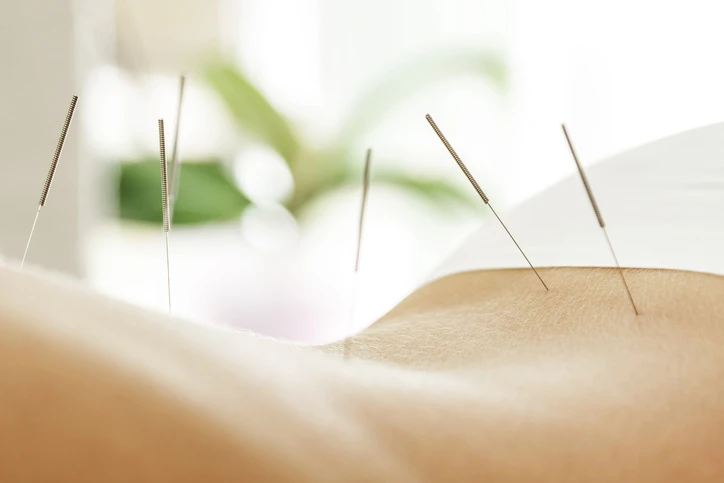Muscle Fascia and Acupuncture
On this occasion, we are talking about Acupuncture and Muscle Fascia, a very important part of our body that turns out to be a great unknown. But before going fully into what fascia is and what are the benefits that acupuncture treatments can have on it, let’s briefly recall what acupuncture is.
What is acupuncture?
Acupuncture is the technique of inserting fine, solid metal needles into the skin. These needles are activated by precise and smooth movements of the practitioner’s hands. They can also be activated by electrostimulation.
Related content: What is Acupuncture
Traditional Chinese Medicine, from which this technique comes, considers that there are more than 2000 interconnected points in the body through meridians. By stimulating these points, they make energy flow and the body heal its ailments.
Acupuncture treats those energy points, returning to the body, both body and mind, the lost balance.
What is muscle fascia?
As we already pointed out at the beginning of this article, the fascia could be described as the great unknown within our body. Other parts of our body have been the subject of countless studies. For this reason, its characteristics and functions are in the public domain. However, the fascia, which as we will see is really important, did not begin to be studied in depth until well into the 20th century.
Today much more is known about her. We can affirm that the fascia is a resistant connective tissue. Among its components are elastin, collagen and hyaluronic acid. The fascia covers our body like a second skin in addition to covering our organs, muscles, bones, veins and cells.
Fascia is throughout our body. In fact, we can refer to several fascias, depending on where they are. In this article we are going to focus on the Muscle Fascia or Myofascial Membrane, which covers our muscles and allows, among other things, movement.
How to maintain the health of the fascia?
Muscular fascia is key in the locomotor function of our body. It protects everything that covers it, among other things our muscle fibers, preventing them from rubbing against each other.
It also facilitates movement, since it is a sliding and slippery fabric. Being the fascia a whole, (remember that it is a connective tissue that is interrelated throughout our body), it would be advisable to keep it healthy in its entirety.
It is important to keep it hydrated so that it does not lose its elasticity (the fascia is made up of 80% water) and its protective properties. Unfortunately, the fascia is the subject of countless injuries, since it is a very delicate tissue.
What should we do to prevent the myofascial membrane from being injured?
Take care of trauma.
The fascia is injured with blows, cuts and ultimately with any trauma that our body suffers. In fact, the fascia is part of the scar tissue. So if a wound or cut, whether due to surgery or accidental, is not treated properly, healing can be ‘faulty’.
And we are not referring only to the external appearance, but to the tissue that accumulates in the epidermis and that can cause, among other things, lack of mobility and temporary and even chronic pain. Avoiding infections in open wounds and trying to promote good healing are key points.
Maintain healthy habits.
The human body, although divided into innumerable parts, is a whole. Everything we expose it to internally or externally has an effect on it. Our eating habits, the exercise we do, the postures we adopt, our sleeping habits…
All these factors influence the health of our body, and of course, the health of the myofascial membrane.
Controlling stress.
It seems that all roads lead to stress, and it is actually one of the direct causes of many of our discomforts. When we get stressed we release cortisol and adrenaline. In episodes of punctual stress, these substances disappear over time.
On the other hand, if stress persists, so do cortisol and adrenaline. They navigate through our body through the lymphatic system, from which the fascia feeds, since the lymph is also responsible for distributing water throughout our body. The fascia loses elasticity and gains rigidity.
This causes us to suffer pain and alter our posture, significantly impairing our state of health.
How can acupuncture help muscle fascia problems?
Fascia interconnects our body like a complex protective network. Any alteration that it suffers affects its entire framework. So it is extremely important to treat your injuries with a methodology that understands their complexity.
Likewise, the treatment must understand the specific lesions as a global problem. One of the pillars of acupuncture is based precisely on this principle.
Treat ailments understanding the body as a set of differentiated but interconnected parts. In such a way that, if one suffers, all the others are destabilized.
Fascia balance is vital to our overall health, and acupuncture can help restore that balance.
How can acupuncture help us?
As we have already seen, Acupuncture can help us treat a wide range of ailments and improve general health. It is considered a safe and effective technique when performed by an accredited professional.
Here are three aspects in which acupuncture can be useful:
Acupuncture to treat scars.
Acupuncture significantly reduces the pain and immobility of a poorly healed scar. It favors blood circulation in the area and decreases adherence (accumulated fascial tissue that causes stiffness and pain in the affected area).
Acupuncture to improve lifestyle habits.
Acupuncture helps reduce the processes related to migraines, headaches and headaches, which we know as headaches. This common pain is often caused by an alteration of the myofascial membrane.
The causes are diverse, including cold, poor posture, poor rest, stress… Headaches prevent us from sleeping well, make us irritable, make us sensitive to light, noise, however light it may be, and In short, it reduces our quality of life.
It is possible to solve through acupuncture something as common but as limiting as a headache. In this way we will reduce the intake of medicines, the quality of our rest will improve, we will resume outdoor activities, we will socialize again and in general, we will live better.
Acupuncture for stress.
Stress causes the myofascial membrane to be altered causing pain. Due to the interconnection of this membrane throughout our body, it is vitally important that we prevent stress from becoming chronic.
Acupuncture has been shown to be a beneficial method in reducing stress and anxiety. With its help, the rigidity of the fascia decreases and therefore the pain that this stiffness causes is attenuated.
Where can I treat muscle fascia problems with acupuncture?
At Zenia Natural, our expert in traditional medicine can inform you about the methods available to care for injuries and alterations in the fascia. And of course she will be able to inform you about any other ailment that may be impairing your quality of life.
Find out here about our different types of treatments and we will help you find the one that best suits you.
It is very important that you always go to certified professionals and that you put your health in the hands of experts. And remember that it is not necessary to wait until something is wrong to start taking care of yourself.


